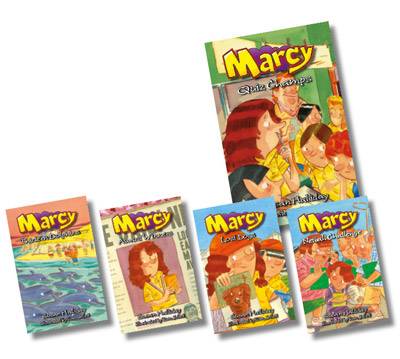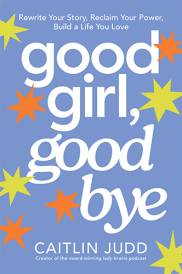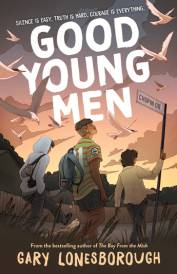Marcy Series #2

Marcy Series #2
Five new and exciting Marcy books!
The first series of Marcy books proved to be very popular with young readers. Marcy, the lead female character from the Toocool books, now has her own series due to female student and teacher demand. Marcy has a go at everything – there is no challenge too large!
Marcy's positive attitude, self-confidence and candid humour are contagious. With best friend Bella in tow, Marcy's adventures will capture the imagination of young readers.
The characters in the Marcy and Toocool books are the same, so this set of ten new books (5 Marcy and 5 Toocool) is a great classroom reading set for female and male students.
Susan Halliday Children's books offer endless opportunities to let your imagination run wild – be you the reader, or the writer.
Writing the MARCY books was great fun and it's wonderful to hear from so many MARCY readers. A special thank you to those of you who have suggested ideas for future MARCY books.
As someone who has always loved books, it won't surprise you that I collect them – lots of them. Some of my favourite books are very, very old and I have a number of children's books that are over 100 years old!
Marcy Series #2
Ford Street Publishing Pty Ltd
Author: Susan Halliday
ISBN: Quiz Champs: 9781921665721
ISBN: Thirteen Dolphins: 9781921665738
ISBN: Lost Dogs: 9781921665745
ISBN: Award Winners: 9781921665752
ISBN: Netball Challenge: 9781921665714
ISBN Box Set: 9781921665882
Price: $9.95 each
Boxed set with Toocool: $89.95
Interview with Susan Halliday
Question: What inspired the Marcy Series?
Susan Halliday: My background is as a former sex discrimination commissioner for Australia, originally I was an English/History teacher and I was the chairperson of the Victorian Institute of Teaching authority.
Reflecting on the nature of my work over the last 25-30 years we saw a period of time where there was a lot of focus on boys and boys reading and while that was exceptionally important what happened, of the downside of that, was there was a lack of emphasis on girls. When looking at the availability of good books in schools there were heaps for boys and a limited numbers for girls.
Phil Kettle had this female character, which was very popular in his Toocol book series for boys. When Phil Kettle would go to schools he was consistently asked 'Why doesn't Marcy have her own series?" Phil and I had a conversation and thought 'Why not?"
Question: Who did you write this series for?
Susan Halliday: The first series of Marcy was written and there were ten books and they were very successful. Whilst the girls were reading the Toocool books we didn't think the boys would read the Marcy books but we actually had boys who were reading the Marcy books. The boys would read them because their sisters had them or they weren't impacted by the fact that someone else was labelling them as a -girls book'.
The reality is that the same characters feature in both books which made them very amenable to both girls and boys irrespective of if they are a Marcy or a Toocool book. We found we had boys saying 'I read my sisters Marcy books after I read the Toocool books" and we found that encouraging and entertaining on a number of fronts. It is kosher for girls to read boys books but there are gender stereotypes applied to boys who may venture into an area that might, in a minor way, be deemed to be female.
The series has been very popular with teachers as class sets, particularly the new ones. Whilst there is still a lineage that people create around girls books and boys books we've created the Toolcool and Marcy books with the same characters in each of the books and this enables the class, when talking about the characters, to know who is who as the chactacter's personality is transferred throughout both book series.
Question: Why was it important to have Marcy as a positive and self-confidence person?
Susan Halliday: The reason she is the way she is, is because there is an underlying theme around anything that is available is available to Marcy; there is nothing she doesn't give a go, she tries everything and there is no gender stereotypes about who can do what or play what sports. It comes at it from an androgynous -I'm a person who gets out, loves life and has a go… and I'm a girl' view; Marcy doesn't identify with being female as a priority. Being female doesn't affect her engagements in life, school, sport and communication however she knows she is a girl and she talks to that in a responsive and proud way.
The aim of the exercise is to show that girls can do whatever girls want; girls are different and we very much identify that Marcy's personality is very different from her friend Bella's to show that there is no one size fits all personality or attitude to life. We often read children's books that are quite dark and may have swearing in them or are confronting and the other aim of the book exercise is that you don't get that far, they occasionally push the envelope to be a bit abrupt as someone may be a bit cranky or frustrated in a child-like way but there is nothing negative about them; that is why they have been such massive hits in schools because schools know there is going to be nothing in Marcy or Toocool books that is problematic.
I worked a lot around the area of bullying and even when Marcy gets a bit pushy what she engages in is not bullying but the different motives of being pushy as she is self-confident and she has an opinion and she assumes she has the right to voice it, first. It is about providing a role model simultaneously we provide other female role models; in the first series Gran-ella was the crazy older women who was really out there and a hippie in her era gone by. Gran-ella was a great female role model because she has been a pilot, basketball player in the world championships and then she's been an architect and an award winning gardener but she bakes a different type of chocolate cake, every day. Gran-ella shows there are wonderful older women who share so much and also have so much to share and she was a purposeful character.
There is very limited characterisation around the parents, they are there to provide a perimeter around what one does and doesn't do and when one does or doesn't get up and there is a reason for that too. We wanted the kids to be the feature and show that it's their world and they are in control, with perimeters, and can have a great time making the best of every opportunity. There are some hilarious moments in class as Marcy is always the highlighted person for talking and we get humour out of her being able to laugh at herself.
Question: What do you enjoy most about creating Marcy adventures?
Susan Halliday: I find myself laughing. A lot of the work that I do in my other various jobs is dealing with difficult and unsavoury situations and sometimes they are riddled with sexism, not always but I generally deal with bad behaviour and I find it cathartic to be able to let my imagination run wild the same way we encourage children to let their imagination run wild when they're writing. Kids often find common sense ways of solving something or talking something through in what we call a reasonable negotiation, this is natural to kids and they do it in a way that is non-detrimental to each other and is supportive of each other. Kids may disagree about who will be the captain of the team but they both will put forward a good point and then there will be compromise that has benefits for both; if only adults could behave as well as these children…
MORE





